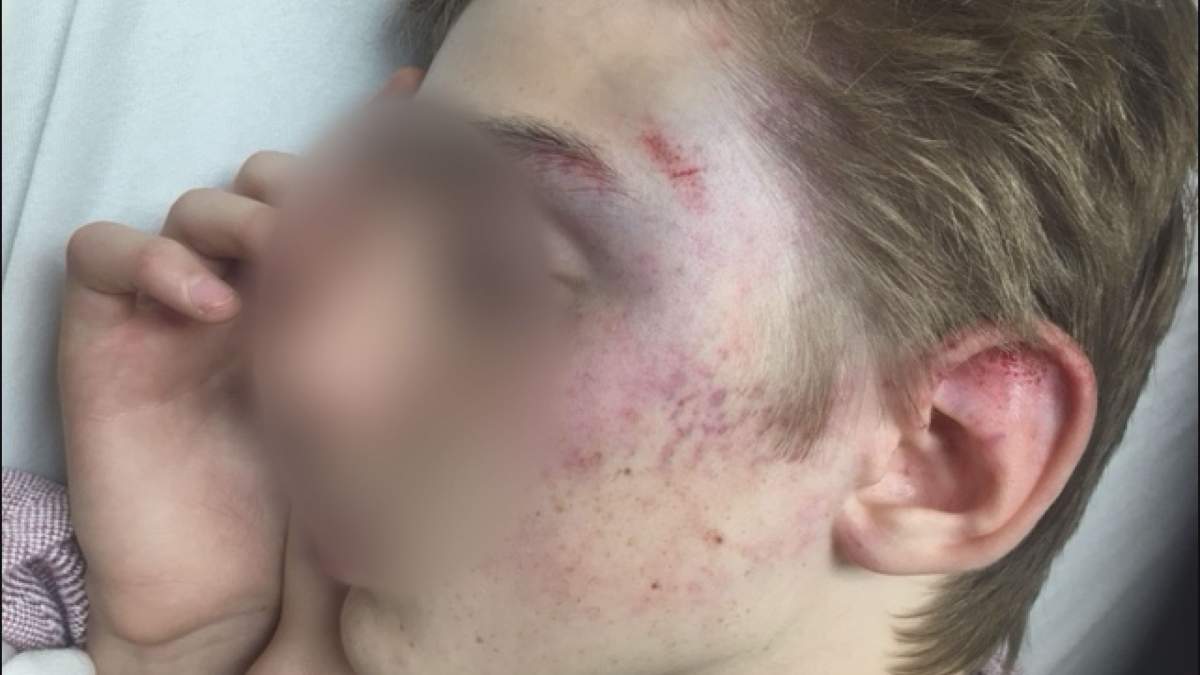Alberta’s police watchdog says a 12-year-old boy with mental health concerns was described as being “uncontrollable and causing damage within the residence” when Calgary officers were called to the Cougar Ridge neighbourhood on Aug. 21 at around 6 p.m.

The Alberta Serious Incident Response Team (ASIRT) released a statement with new details Friday, after the parents of Jack Parcells came forward to Global News about the alleged assault. His parents told Global News the boy has autism, anxiety and ADHD.
“Police determined that the youth may have been off his prescribed medication for several days and was confined to his locked bedroom at the time of the call,” the statement said.
According to ASIRT, Calgary police officers – acting on a request to transport the boy to hospital – escorted the boy to their vehicle, where he is “believed to have sustained a serious head injury.”
Jack’s parents, Doug and Mary Ann Parcells, said he remains in hospital recovering from a fractured skull, partial hearing loss and other external injuries.
“Jack is doing OK, still no hearing on the right side,” Doug said Friday afternoon. “He is also getting the mental health support now that we were trying to get him. Two ASIRT detectives came out to the house and interviewed us last night. Based on that meeting, we feel that there will be a complete and proper investigation.”
The parents allege Calgary police assaulted the boy after the situation escalated.
WATCH BELOW: Alberta’s police watchdog is investigating after a 12-year-old boy was injured. A Calgary family says they called police for help, but instead their son ended up in emergency. Jill Croteau reports.

At the time of the incident, ASIRT said “the youth was struggling with officers”—a characterization Doug Parcells objects to.
ASIRT said the boy was not handcuffed and had not yet been placed in the police vehicle when the incident happened.

Get daily National news
“Police were advised that the youth had been in the care of other family members for several days and exhibited behavioural concerns upon returning to his parents,” the statement read.
EMS was called and took the boy to hospital where his parents learned that he had suffered a fracture to his skull, ASIRT said.
ASIRT said no other details will be provided until its investigation has ended.
Calgary police released a statement Thursday, saying its members take any in-custody injury seriously–“especially those involving a minor”–and added the incident did not have “the outcome that anyone involved wanted.”
WATCH BELOW: Linda Olsen talks to an expert in disability studies from the University of Calgary on the unique aspects of interacting with people on the autism spectrum. The investigation continues into an incident in which a Calgary boy with autism was injured while in the care of police.

Use of force and crisis intervention training
A report on ‘use of force’ released three months ago by former chief justice Neil Wittman detailed the need for specialized and focused crisis intervention training.
Wittman recommended authorities also need more frequent training when interacting with people with mental health conditions. Mount Royal University justice studies professor Doug King said it’s likely those training recommendations haven’t yet been implemented.
“The question I have is, ‘Did officers have sufficient training dealing with a youth in crisis to be able to deal with this in a manner that would not have led to this?’” King said, adding the family and the public should be comforted by the fact ASIRT is on the case.
“Any parent who is reading about this is saying, ‘How could these big burly officers slam a 12-year-old child into the ground?’ We need to sit back and let it be investigated,” King said.
One Calgary professional who conducts specialized training for first responders said she offered her program to the Calgary Police Service (CPS). The training had been adopted by the Calgary Fire Department in 2016.
But according to Shelley Boychuk with the Special Needs Advocacy & Education Network, her offer was turned down.
“Having knocked on the door of CPS previously, and wanting to work with them and come up with a way to have their 2200 members trained, it shocked me [that] it would happen in our city,” Boychuck said.
“Our police force feels confident with their officers in their dealings with the public and at the time we discussed training, they didn’t see the need to do mandatory training with autism and special needs.”
The Calgary Police Service said their officers are trained to not try to diagnose any mental health illnesses when responding to calls.
In a statement, CPS said “This is outside of their expertise and can lead to inappropriate responses if the officers are mistaken. Instead, officers are trained to determine their response based on the behaviour of the individual to which they are responding, with a focus on de-escalating the situation whenever possible.”
“Scenarios and training on how to manage mental health crises are also worked into the training new officers receive on controlling and communicating with subjects,” the statement read.
With files from Jill Croteau








Comments
Want to discuss? Please read our Commenting Policy first.